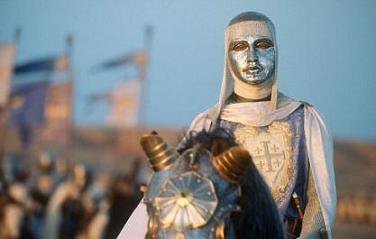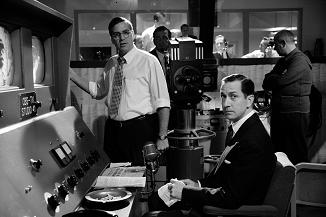“‘I think people will find something in the objects to provoke new levels of interest and new levels of scholarship,’ Howard Dodson, chief of the Schomburg, said in an interview. ‘We’ve consciously tried to stay away from putting a heavy interpretative line on it and to let Malcolm X speak for himself.’” The NYT previews the new Malcolm X exhibit, opening at the Schomburg Center next Thursday.
Category: History
Not Like Ike.
And here I thought the military-industrial complex speech was prescient…
(Quote and links seen at Medley and birddogged by David Sirota):
“Should any political party attempt to abolish social security, unemployment insurance, and eliminate labor laws and farm programs, you would not hear of that party again in our political history. There is a tiny splinter group, of course, that believes you can do these things. Among them are…a few other Texas oil millionaires, and an occasional politician or business man from other areas. Their number is negligible and they are stupid.” – Dwight D. Eisenhower, 11/8/54
My Back Pages.
If you’ve arrived from Ralph Luker‘s kind article in this month’s AHA Perspectives, welcome to GitM. If you click and/or scroll around enough, you should be able to find something that catches your fancy around here. And, if you’re looking for more quality weblogs by historians (and aspiring historians), check out Cliopatria’s comprehensive History Blogroll.
Don’t Fault Yalta.
“Bush stopped short of accusing Franklin D. Roosevelt and Winston Churchill of outright perfidy, but his words recalled those of hardcore FDR- and Truman-haters circa 1945…Bush’s cavalier invocations of history for political purposes are not surprising. But for an American president to dredge up ugly old canards about Yalta stretches the boundaries of decency and should draw reprimands (and not only from Arthur M. Schlesinger Jr.)” Slate‘s David Greenberg outlines Dubya’s recent mischaracterization of the Yalta conference. Well, Dubya doesn’t even seem to understand diplomacy now, so why would he understand it then?
Empires and Shadows.
A couple of NYT book reviews of local interest: Columbia’s Eric Foner peruses the first transcribed volume of the LBJ tapes, Johann Hari reviews Irresistible Empire by Columbia historian Victoria de Grazia, and college acquaintance Nell Freudenberger takes a gander at Stewart O’Nan’s The Good Wife.
Heaven’s Gate.
 Well, I don’t think being feverish at the time helped by any means — still, Ridley Scott’s Kingdom of Heaven is, well, kinda blah. It’s got its heart in the right place, and I’d say I was mildly diverted by it for the first 75 minutes or so, but after that I was just waiting for it to be over. In terms of recent sword-and-sandal and/or historical siege pics, I’d say it’s better than King Arthur or the woeful Alexander, but probably on a par with Troy or The Alamo.
Well, I don’t think being feverish at the time helped by any means — still, Ridley Scott’s Kingdom of Heaven is, well, kinda blah. It’s got its heart in the right place, and I’d say I was mildly diverted by it for the first 75 minutes or so, but after that I was just waiting for it to be over. In terms of recent sword-and-sandal and/or historical siege pics, I’d say it’s better than King Arthur or the woeful Alexander, but probably on a par with Troy or The Alamo.
Put very bluntly, the gist is this: Legolas (Orlando Bloom) is an ornery, grieving blacksmith somewhere in France who, after a visitation from a world-weary crusader, Lord Qui-Gon (Liam Neeson, playing yet another expository mentor/dead-duck), and his hospitaler, Prof. Lupin (David Thewlis), decides to embark to the Holy Land to seek Christ’s forgiveness for the suicide of his wife. Along the way, he makes a Muslim friend in Dr. Bashir (Alexander Siddig) and a Christian enemy in Celeborn (Marton Csoskas), and discovers that zealots are generally rather unlikable people on both sides of the religious divide. Upon arriving in Jerusalem, Legolas is feted at the court of leper King Tyler Durden (a masked Edward Norton), whereupon he makes more friends (Jeremy Irons, Eva Green) and enemies (Brendan Gleeson, hamming it up like a community-theater Brian Cox), all before an interminably long siege against the forces of Saladin (a charismatic Ghassan Massoud.)
 Are all those fanboy comparisons unfair? Well, not after sitting through the last hour, which basically played like Helms Deep and Minas Tirith all over again. Yes, the production values are immaculate and all the (fetishized) weaponry is used in suitably historic fashion, but, really, how many historic sieges can one be expected to sit through in a given couple of years? Frankly, Kingdom of Heaven was more interesting in the early going, when there was more acting amid the fighting.
Are all those fanboy comparisons unfair? Well, not after sitting through the last hour, which basically played like Helms Deep and Minas Tirith all over again. Yes, the production values are immaculate and all the (fetishized) weaponry is used in suitably historic fashion, but, really, how many historic sieges can one be expected to sit through in a given couple of years? Frankly, Kingdom of Heaven was more interesting in the early going, when there was more acting amid the fighting.
As for the politics, well…the message of the film — religion good, religious zealots bad — is laudable and well-worth hearing these days, perhaps even brave. But, while confessing a near-total ignorance of medieval history, Kingdom of Heaven sure doesn’t seem very historical in its 21st century forward-mindedness. At one point before the siege, Legolas not only makes the case for religious tolerance but completely dismantles the feudal caste system — I was almost waiting for him to institute the ballot box and universal public education while he was at it.
In short, even though I’m in sympathy with the general pluralist worldview of Kingdom of Heaven, the movie could have definitely done with less anachronistic liberal humanism and more dramatic complexity. (In fact, I can’t think of a single character in the film who displayed more than one dimension.) And, even notwithstanding the history, there just needed to be more characterization and less CGI-battling here. As both an historical epic and a summer popcorn film, Kingdom of Heaven felt only a step or two above Purgatory.
See it Now.
 The first pic from Goodnight & Good Luck, George Clooney’s forthcoming film about Edward Murrow’s televised unmasking of Joe McCarthy, is now online. The cast includes Clooney (Fred Friendly), David Strathairn (Murrow), Frank Langella (Bill Paley), Patricia Clarkson, Jeff Daniels, and Robert Downey, Jr.
The first pic from Goodnight & Good Luck, George Clooney’s forthcoming film about Edward Murrow’s televised unmasking of Joe McCarthy, is now online. The cast includes Clooney (Fred Friendly), David Strathairn (Murrow), Frank Langella (Bill Paley), Patricia Clarkson, Jeff Daniels, and Robert Downey, Jr.
Amadeus Chic.
Fans of period pieces and the ultraviolence take note: Today brings our first looks at Ed Harris as Ludwig Van in Copying Beethoven and Kirsten Dunst as Marie Antoinette in Sofia Coppola’s forthcoming biopic of the Austrian princess.
The Blackness of Space.
“It was a different time, 1957 or ’58. America’s love affair with racism was in full swing. NASA was no exception.” Ted at The Late Adopter sends along a sordid tale of cosmic achievement and racial injustice in this award-winning documentary on The Old Negro Space Program, a film not by Ken Burns.
Strike Addendum.
Regarding yesterday’s strike memo hullabaloo, we found out today on good authority that Provost Brinkley did not write the memo, that it in no way respects his views, and that none of the punitive measures listed therein have a snowball’s chance in Hell of being enacted under this administration. Obviously, in a perfect world, the provost wouldn’t have initialed this internal memo at all, but this information definitely accords better with my sense of what’s going on and with my measure of the man.
